Province, municipalities eyeing regulations for Airbnb
Data collection is a crucial first step to proper regulation for the short term rental industry in B.C. says the head of the advisory group pushing the province for regulations.
“The regulatory framework will stop those things we don’t want to see and encourage those things that we do want to see,” Whistler Mayor Jack Crompton told iNFOnews.ca. “Access to data is critical for us to be able to regulate well.”
Crompton is the spokesperson for a joint advisory group set up by the province and the Union of B.C. Municipalities to make recommendations for regulating the industry similar to what is done for Uber ride rentals, home inspectors or travel agencies.
READ MORE: Getting handle on short-term rentals like Airbnb key to easing housing shortage in B.C.
“The industry has grown exponentially over the last 10 years and it’s largely unregulated,” Crompton said.
The idea is to regulate the industry, not to stop it.
While local governments can bring in zoning regulations and bylaws to control some parts of the industry, it’s much tougher, especially for smaller communities, to enforce the rules.
“The province can have conversations with large multinationals like Airbnb that communities like Summerland or Osoyoos simply can’t,” Crompton said. “This kind of regulatory framework would provide the tools that Summerland or Osoyoos don’t have or can’t pay for.”
The advisory group is asking the province to bring in rules that require commercial operators (hosts with numerous properties) to register as businesses and for the province to create an online portal where hosts have to display their business licences and complaints can be registered.
Other required data could include addresses, ownership, unit type, legal tenure, frequency of use, income, parking and complaints about things like noise.
“Current practices require governments to contract with third-party data providers or assign staff to manually scan online accommodation platforms, which are costly and inefficient approaches that may not always yield accurate and complete data,” the advisory group’s report states. “Requiring all participants in the online accommodation industry to adhere to common standards of data-sharing provides fairness in the industry and reduces the burden of tracking property listings across multiple platforms.”
Major players, like Airbnb, real estate, hotel and tourism associations were consulted.
The idea is to have an industry that is properly regulated throughout the province but also to protect the supply of rental housing for long term residents. Crompton sees both goals as being compatible.
The next step is up to government.
The report was presented jointly to the provincial ministers of housing, finance and municipal affairs.
“They share this desire to realize secure rental housing stock for British Columbians and a healthy tourism sector,” Crompton said. “This is not something that we feel we’re bringing to them without interest from their side. This is an effort that we are taking on together and we are hopeful they will move quickly.”
That whole process could be slowed by the need to do further study of some of the 13 requests and doing things like protecting the privacy of those posting data on the website, the report says.
READ MORE: Why Interior Airbnb hosts may have a decent summer after all
To contact a reporter for this story, email Rob Munro or call 250-808-0143 or email the editor. You can also submit photos, videos or news tips to the newsroom and be entered to win a monthly prize draw.
We welcome your comments and opinions on our stories but play nice. We won't censor or delete comments unless they contain off-topic statements or links, unnecessary vulgarity, false facts, spam or obviously fake profiles. If you have any concerns about what you see in comments, email the editor in the link above.




